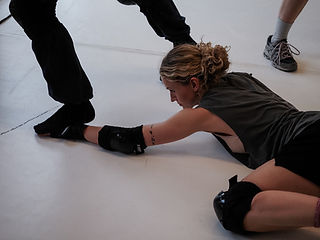
TENDER UNIT
Tender Unit is a new research project investigating how psychological defence mechanisms can be embodied and expressed through movement. I am interested in the interplay between vulnerability & hardness in interpersonal relationships. Using protective gear (knee pads, elbow pads, wrist guards) as costumes, we aim to discover physical expressions for our emotional defense mechanisms in our search for closeness with ourselves & others.
Defense mechanisms can be defined as unconscious psychological strategies we use to cope with unacceptable or overwhelming emotions. They develop early in life and often function by psychologically redefining a situation, allowing us to avoid confronting uncomfortable realities about ourselves and others. In emotionally threatening situations—such as when we feel humiliated or rejected—these mechanisms may be triggered. Particularly in close relationships, where we invest emotionally and are open and vulnerable, we may react with mechanisms like denial, projection, or acting out—pushing those closest to us away. At the same time, there are also "mature" defense mechanisms that protect us from genuinely harmful situations and contribute to a healthy and stable emotional life. Defense mechanisms are thus both necessary tools for navigating life but can also prevent us from achieving genuine closeness with ourselves and others.
The project draws on theoretical insights from thinkers such as Karen Horney, who emphasized that human behavior is driven by a fundamental need for security & love. When these needs are not met, people develop defense mechanisms to cope with feelings of inadequacy & fear. Willem Reich’s theories on somatic psychology highlight how our behavior patterns manifest directly in body posture, facial expressions, & muscle tension—what he called “character armor.” Both Horney & Reich build on Carl Jung’s theories about how we construct our psychological landscapes.
The main focus of the project overall is to create dance expressions for defense mechanisms and to search for a physicality that feels new, exciting, and unique to Tender unit. The methods we use serve these goals, and we are also prepared to adapt our plans according to how the process unfolds and to explore ideas that arise within the group: ‘Tender Unit’ is about and for people, and those participating in the process will play a central role in shaping it.
Supported by Dansverkstædid (Iceland), Dans/5 (Norway) and Arts Council England.







RESEARCH AND REFLECTION VIDEO
SUMMER RESIDENCY




.png)

